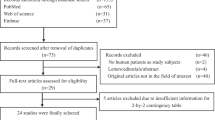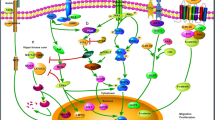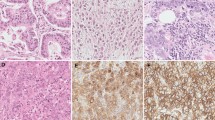Abstract
Background
Tumor-associated macrophages (TAMs) are key components of colorectal cancer (CRC) microenvironment, but their role in CRC prognosis is not fully defined.
Objective
This study aimed to evaluate prognostic value of different types and distribution of TAMs in CRC.
Methods
Total 27 studies with 6115 patients were searched from PubMed and Embase and analyzed to determine the association between TAMs, including distinct TAM subsets and infiltration location, and CRC survival. The prognostic impact of TAMs on CRC was further stratified by tumor type and mismatch repair system (MMR) status.
Results
A pooled analysis indicated that high density of TAMs in CRC tissue was significantly associated with favorable 5-year overall survival (OS) but not with disease-free survival (DFS). CD 68+ TAM subset correlated with better 5-year OS, while neither CD68+NOS2+ M1 subset nor CD163+ M2 subset was correlated with 5-year OS. Increased CD68+ TAM infiltration in tumor stroma but not in tumor islet predicted improved 5-year OS. Stratification by tumor type and MMR status showed that in colon cancer or MMR-proficient CRC, elevated TAM density was associated with better 5-year OS.
Conclusions
High infiltration of CD68+ TAMs could be a favorable prognostic marker in CRC. Future therapies stimulating CD68+ TAM infiltration may be promising in CRC treatment.




Similar content being viewed by others
Data availability
All data are available upon request.
Abbreviations
- CI:
-
confidence interval
- CRC:
-
colorectal cancer
- DFS:
-
disease-free survival
- HE:
-
hematoxylin-eosin
- HR:
-
hazard ratio
- IHC:
-
immunohistochemistry
- MMR:
-
mismatch repair system
- NOS:
-
Newcastle-Ottawa Scale
- NOS2:
-
nitric oxide synthase 2
- OS:
-
overall survival
- TAMs:
-
tumor-associated macrophages
- TI:
-
tumor islet
- TS:
-
tumor stroma
References
Torre LA, Bray F, Siegel RL, Ferlay J, Lortet-Tieulent J, Jemal A (2015) Global cancer statistics, 2012. CA Cancer J Clin 65(2):87–108
Bockelman C, Engelmann BE, Kaprio T, Hansen TF, Glimelius B (2015) Risk of recurrence in patients with colon cancer stage II and III: a systematic review and meta-analysis of recent literature. Acta Oncol 54(1):5–16
Alwarthan HAM, Al Anazi MS, Parine NR, Bhat RS, Alamro G, Aljarbou F, Al-Daihan SK (2019) The expressional level of tankyrase-1 gene and its regulation in colorectal cancer in a Saudi population. Biocell 43(2):51–58
Koelzer VH, Dawson H, Andersson E, Karamitopoulou E, Masucci GV, Lugli A, Zlobec I (2015) Active immunosurveillance in the tumor microenvironment of colorectal cancer is associated with low frequency tumor budding and improved outcome. Transl Res 166(2):207–217
Korehisa S, Oki E, Iimori M, Nakaji Y, Shimokawa M, Saeki H, Okano S, Oda Y, Maehara Y (2018) Clinical significance of programmed cell death-ligand 1 expression and the immune microenvironment at the invasive front of colorectal cancers with high microsatellite instability. Int J Cancer 142(4):822–832
Oh DY, Venook AP, Fong L (2015) On the verge: immunotherapy for colorectal carcinoma. J Natl Compr Cancer Netw 13(8):970–978
Signorini L, Delbue S, Ferrante P, Bregni M (2016) Review on the immunotherapy strategies against metastatic colorectal carcinoma. Immunotherapy 8(10):1245–1261
Bindea G, Mlecnik B, Tosolini M, Kirilovsky A, Waldner M, Obenauf AC, Angell H, Fredriksen T, Lafontaine L, Berger A, Bruneval P, Fridman WH, Becker C, Pagès F, Speicher MR, Trajanoski Z, Galon J (2013) Spatiotemporal dynamics of intratumoral immune cells reveal the immune landscape in human cancer. Immunity 39(4):782–795
Ostuni R, Kratochvill F, Murray PJ, Natoli G (2015) Macrophages and cancer: from mechanisms to therapeutic implications. Trends Immunol 36(4):229–239
Koelzer VH, Canonica K, Dawson H, Sokol L, Karamitopoulou-Diamantis E, Lugli A, Zlobec I (2016) Phenotyping of tumor-associated macrophages in colorectal cancer: impact on single cell invasion (tumor budding) and clinicopathological outcome. Oncoimmunology 5(4):e1106677
Chaput N, Svrcek M, Auperin A, Locher C, Drusch F, Malka D, Taieb J, Goere D, Ducreux M, Boige V (2013) Tumour-infiltrating CD68+ and CD57+ cells predict patient outcome in stage II-III colorectal cancer. Br J Cancer 109(4):1013–1022
Forssell J, Oberg A, Henriksson ML, Stenling R, Jung A, Palmqvist R (2007) High macrophage infiltration along the tumor front correlates with improved survival in colon cancer. Clin Cancer Res 13(5):1472–1479
Funada Y, Noguchi T, Kikuchi R, Takeno S, Uchida Y, Gabbert HE (2003) Prognostic significance of CD8+ T cell and macrophage peritumoral infiltration in colorectal cancer. Oncol Rep 10(2):309–313
Herrera M, Herrera A, Dominguez G, Silva J, Garcia V, Garcia JM, Gomez I, Soldevilla B, Munoz C, Provencio M et al (2013) Cancer-associated fibroblast and M2 macrophage markers together predict outcome in colorectal cancer patients. Cancer Sci 104(4):437–444
Shabo I, Olsson H, Sun XF, Svanvik J (2009) Expression of the macrophage antigen CD163 in rectal cancer cells is associated with early local recurrence and reduced survival time. Int J Cancer 125(8):1826–1831
Algars A, Irjala H, Vaittinen S, Huhtinen H, Sundstrom J, Salmi M, Ristamaki R, Jalkanen S (2012) Type and location of tumor-infiltrating macrophages and lymphatic vessels predict survival of colorectal cancer patients. Int J Cancer 131(4):864–873
Baeten CI, Castermans K, Hillen HF, Griffioen AW (2006) Proliferating endothelial cells and leukocyte infiltration as prognostic markers in colorectal cancer. Clin Gastroenterol Hepatol 4(11):1351–1357
Zlobec I, Minoo P, Terracciano L, Baker K, Lugli A (2011) Characterization of the immunological microenvironment of tumour buds and its impact on prognosis in mismatch repair-proficient and -deficient colorectal cancers. Histopathology 59(3):482–495
Yamauchi M, Lochhead P, Morikawa T, Huttenhower C, Chan AT, Giovannucci E, Fuchs C, Ogino S (2012) Colorectal cancer: a tale of two sides or a continuum? Gut 61(6):794–797
Yamauchi M, Morikawa T, Kuchiba A, Imamura Y, Qian ZR, Nishihara R, Liao X, Waldron L, Hoshida Y, Huttenhower C, Chan AT, Giovannucci E, Fuchs C, Ogino S (2012) Assessment of colorectal cancer molecular features along bowel subsites challenges the conception of distinct dichotomy of proximal versus distal colorectum. Gut 61(6):847–854
Zhang QW, Liu L, Gong CY, Shi HS, Zeng YH, Wang XZ, Zhao YW, Wei YQ (2012) Prognostic significance of tumor-associated macrophages in solid tumor: a meta-analysis of the literature. PLoS One 7(12):e50946
Bauer K, Michel S, Reuschenbach M, Nelius N, von Knebel DM, Kloor M (2011) Dendritic cell and macrophage infiltration in microsatellite-unstable and microsatellite-stable colorectal cancer. Familial Cancer 10(3):557–565
Xiao Y, Freeman GJ (2015) The microsatellite instable subset of colorectal cancer is a particularly good candidate for checkpoint blockade immunotherapy. Cancer Discov 5(1):16–18
Stang A (2010) Critical evaluation of the Newcastle-Ottawa scale for the assessment of the quality of nonrandomized studies in meta-analyses. Eur J Epidemiol 25(9):603–605
Parmar MK, Torri V, Stewart L (1998) Extracting summary statistics to perform meta-analyses of the published literature for survival endpoints. Stat Med 17(24):2815–2834
Tierney JF, Stewart LA, Ghersi D, Burdett S, Sydes MR (2007) Practical methods for incorporating summary time-to-event data into meta-analysis. Trials 8:16
Edin S, Wikberg ML, Dahlin AM, Rutegard J, Oberg A, Oldenborg PA, Palmqvist R (2012) The distribution of macrophages with a M1 or M2 phenotype in relation to prognosis and the molecular characteristics of colorectal cancer. PLoS One 7(10):e47045
Gulubova M, Ananiev J, Yovchev Y, Julianov A, Karashmalakov A, Vlaykova T (2013) The density of macrophages in colorectal cancer is inversely correlated to TGF-beta1 expression and patients' survival. J Mol Histol 44(6):679–692
How J, Brown JR, Saylor S, Rimm DL (2014) Macrophage expression of tartrate-resistant acid phosphatase as a prognostic indicator in colon cancer. Histochem Cell Biol 142(2):195–204
Illemann M, Laerum OD, Hasselby JP, Thurison T, Hoyer-Hansen G, Nielsen HJ, Christensen IJ (2014) Urokinase-type plasminogen activator receptor (uPAR) on tumor-associated macrophages is a marker of poor prognosis in colorectal cancer. Cancer Med 3(4):855–864
Inoue Y, Nakayama Y, Minagawa N, Katsuki T, Nagashima N, Matsumoto K, Shibao K, Tsurudome Y, Hirata K, Nagata N, Itoh H (2005) Relationship between interleukin-12-expressing cells and antigen-presenting cells in patients with colorectal cancer. Anticancer Res 25(5):3541–3546
Khorana AA, Ryan CK, Cox C, Eberly S, Sahasrabudhe DM (2003) Vascular endothelial growth factor, CD68, and epidermal growth factor receptor expression and survival in patients with stage II and stage III colon carcinoma: a role for the host response in prognosis. Cancer 97(4):960–968
Kinouchi M, Miura K, Mizoi T, Ishida K, Fujibuchi W, Ando T, Yazaki N, Saito K, Shiiba K, Sasaki I (2011) Infiltration of CD14-positive macrophages at the invasive front indicates a favorable prognosis in colorectal cancer patients with lymph node metastasis. Hepatogastroenterology 58(106):352–358
Nagorsen D, Voigt S, Berg E, Stein H, Thiel E, Loddenkemper C (2007) Tumor-infiltrating macrophages and dendritic cells in human colorectal cancer: relation to local regulatory T cells, systemic T-cell response against tumor-associated antigens and survival. J Transl Med 5:62
Nebiker CA, Han J, Eppenberger-Castori S, Iezzi G, Hirt C, Amicarella F, Cremonesi E, Huber X, Padovan E, Angrisani B, Droeser RA, Rosso R, Bolli M, Oertli D, von Holzen U, Adamina M, Muraro MG, Mengus C, Zajac P, Sconocchia G, Zuber M, Tornillo L, Terracciano L, Spagnoli GC (2014) GM-CSF production by tumor cells is associated with improved survival in colorectal Cancer. Clin Cancer Res 20(12):3094–3106
Ohnishi K, Komohara Y, Saito Y, Miyamoto Y, Watanabe M, Baba H, Takeya M (2013) CD169-positive macrophages in regional lymph nodes are associated with a favorable prognosis in patients with colorectal carcinoma. Cancer Sci 104(9):1237–1244
Richards CH, Flegg KM, Roxburgh CS, Going JJ, Mohammed Z, Horgan PG, McMillan DC (2012) The relationships between cellular components of the peritumoural inflammatory response, clinicopathological characteristics and survival in patients with primary operable colorectal cancer. Br J Cancer 106(12):2010–2015
Shibutani M, Maeda K, Nagahara H, Fukuoka T, Nakao S, Matsutani S, Hirakawa K, Ohira M (2017) The peripheral monocyte count is associated with the density of tumor-associated macrophages in the tumor microenvironment of colorectal cancer: a retrospective study. BMC Cancer 17(1):404
Tan SY, Fan Y, Luo HS, Shen ZX, Guo Y, Zhao LJ (2005) Prognostic significance of cell infiltrations of immunosurveillance in colorectal cancer. World J Gastroenterol 11(8):1210–1214
Zhou Q, Peng RQ, Wu XJ, Xia Q, Hou JH, Ding Y, Zhou QM, Zhang X, Pang ZZ, Wan DS et al (2010) The density of macrophages in the invasive front is inversely correlated to liver metastasis in colon cancer. J Transl Med 8:13
Cavnar MJ, Turcotte S, Katz SC, Kuk D, Gonen M, Shia J, Allen PJ, Balachandran VP, D'Angelica MI, Kingham TP et al (2017) Tumor-associated macrophage infiltration in colorectal cancer liver metastases is associated with better outcome. Ann Surg Oncol 24(7):1835–1842
Kim Y, Wen X, Bae JM, Kim JH, Cho NY, Kang GH (2018) The distribution of intratumoral macrophages correlates with molecular phenotypes and impacts prognosis in colorectal carcinoma. Histopathology 73(4):663–671
Li Z, Xu Z, Huang Y, Zhao R, Cui Y, Zhou Y, Wu X (2018) The predictive value and the correlation of peripheral absolute monocyte count, tumor-associated macrophage and microvessel density in patients with colon cancer. Medicine (Baltimore) 97(21):e10759
Ma J, Liu L, Che G, Yu N, Dai F, You Z (2010) The M1 form of tumor-associated macrophages in non-small cell lung cancer is positively associated with survival time. BMC Cancer 10:112
Ohno S, Inagawa H, Dhar DK, Fujii T, Ueda S, Tachibana M, Suzuki N, Inoue M, Soma G, Nagasue N (2003) The degree of macrophage infiltration into the cancer cell nest is a significant predictor of survival in gastric cancer patients. Anticancer Res 23(6D):5015–5022
Nagtegaal ID, Marijnen CA, Kranenbarg EK, Mulder-Stapel A, Hermans J, van de Velde CJ, van Krieken JH (2002) Short-term preoperative radiotherapy interferes with the determination of pathological parameters in rectal cancer. J Pathol 197(1):20–27
Acknowledgments
This project was supported by the Innovation Commission of Kunming University of Science and Technology (No. KKSY 201860009) and Foundation of Yunnan Provincial Science and Technology (Nos. 2017NS208, 2018NS0232, 2018NS0231).
Author information
Authors and Affiliations
Contributions
Jinyuan Li, Linhai Li, Yuejin Li, Yaxin Long, Yiming Ouyang, Quan Zhao, and Weimin Bao collected and analyzed the data. Kunmei Gong designed the study and wrote the manuscript.
Corresponding author
Ethics declarations
Conflict of interest
The authors declare that they have no competing interests.
Additional information
Publisher’s note
Springer Nature remains neutral with regard to jurisdictional claims in published maps and institutional affiliations.
Rights and permissions
About this article
Cite this article
Li, J., Li, L., Li, Y. et al. Tumor-associated macrophage infiltration and prognosis in colorectal cancer: systematic review and meta-analysis. Int J Colorectal Dis 35, 1203–1210 (2020). https://doi.org/10.1007/s00384-020-03593-z
Accepted:
Published:
Issue Date:
DOI: https://doi.org/10.1007/s00384-020-03593-z




